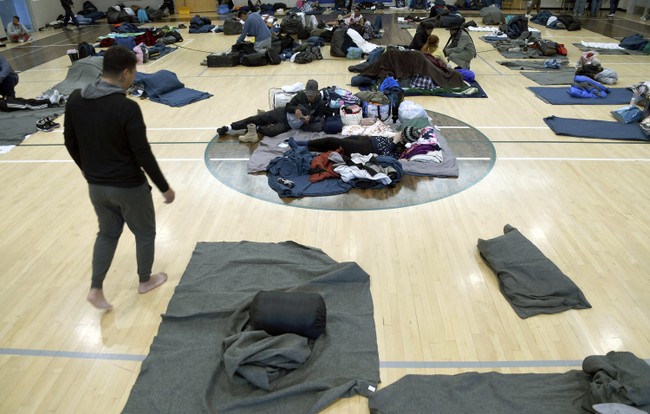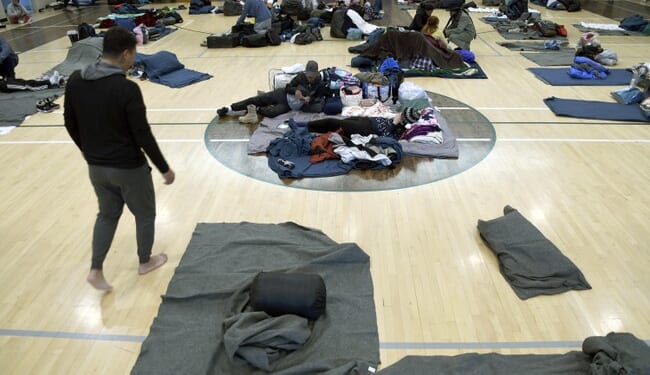
It started as a rumbling in Chicago’s predominantly black neighborhoods on the city’s south and west sides. Black Chicagoans are watching the city spending tens of millions of dollars on newly arrived migrants after years of unmet promises from the Chicago political establishment to black people in the poorest neighborhoods.
“All these people, I have supported every one of them,” Cata Truss, a 57-year-old mother on the West Side, says about Mayor Brandon Johnson and his progressive allies.
“I was like, ‘Are you freaking kidding me,'” Truss added. She had just found out that the city was going to take over Amundsen Park — what she calls “the crown jewel of the community” — for use by migrants.
Chicago prides itself on being a “welcoming city” — just not to black residents.
According to The Free Press, “Chicago has greeted nearly 35,000 new arrivals with resources like laundry services, mental health screenings, and $15,000 in rental support per person — all funds that Truss says could’ve gone a long way in Amundsen Park in Chicago’s Austin neighborhood, where nearly 28 percent of residents live below the poverty line.”
Black Chicagoans are no longer trying to hide their resentment. They don’t necessarily resent the migrants, although it’s hard not to when the city is spending extravagantly on them. They resent the black Democratic establishment for allowing the situation to reach a crisis point with little or no input from neighborhood groups, who are the backbone of the Democratic Party in the city.
The city of Chicago is now facing seven lawsuits, at least three of them filed by people of color, all bound by a concern that their leaders would rather serve the migrants than their own vulnerable citizens. Truss is now represented by Deidre Baumann, a Democratic civil rights attorney working on a pro bono basis, along with her four co-plaintiffs, all of whom are black. A second suit, in the South Side, has two black plaintiffs. A third, in Chicago’s Brighton Park, is led by five Hispanic residents and one Asian American.
Although critics often claim that only “extreme MAGA Republicans” oppose the record influx of migrants into the U.S., if you visit Chicago like I did earlier this month, you’ll see that these plaintiffs are not motivated by bigotry. Instead, most of them are minorities who feel their communities are getting the short end of the stick.
That’s not the half of it. One of the most Democratic cities in the nation is seeing its black politicians booed by angry residents in neighborhoods. The bottom line is that the crisis is leading a sizable number of black Chicagoans to consider sitting the 2024 election out or even voting for Donald Trump.
This wouldn’t affect the presidential race. Illinois is going to go for Biden no matter what happens with the vote in Chicago, but in statewide races, a falloff in support from black voters could lead to some upsets.
And it’s not just Chicago seeing black support dwindle for Democrats.
The crisis is leading many Democrats to turn on their own party. I spoke with 18 Democrats in Chicago, including a restorative justice advocate, a former Obama intern, and an exonerated felon, who all told me they’re considering sitting out the election this year rather than vote for President Joe Biden. A couple said they’re even thinking of voting for Donald Trump. It’s a phenomenon that’s being reflected in national polls, with Trump on track to win nearly a quarter of the black vote in key battleground states. That means that a fifth of black voters, who voted for Biden by a margin of 92 percent in 2020, could turn their back on the president.
If Donald Trump gets even 15% of the black vote, he wins in a landslide.
Black leaders in Chicago have been trying to shift the focus away from the migrant crisis as Biden’s problem to labeling it a crisis that Gov. Greg Abbott (R-Texas) created. That may have worked at first, but no longer.
“What the Democratic Party doesn’t want black people to hear is that this is a Biden policy,” says J. Darnell Jones, another plaintiff suing the city. “Biden is allowing the borders to remain open.”
This resentment that Chicago’s black community manifested is not a permanent realignment — yet. But no voter likes to be taken for granted, and black Democrats are reaching a boiling point.

